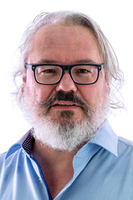Benedikt Berninger
Physiological and Induced Neurogenesis in the Adult and Ageing Brain

For most parts of the brain, neurogenesis ceases forever with the end of embryonic development. In the adult brain, only the dentate gyrus of the hippocampus and the subventricular zone lining the lateral ventricle maintain neural stem cell activity. Yet even in these regions, neurogenesis progressively decreases, thereby contributing to the age-dependent decline in cognitive flexibility. We wish to uncover the molecular underpinnings of why this is so and discover what could be done to overcome this ageing-dependent decrease in neurogenesis. Remarkably, during ageing, neural stem cells spend more time in a quiescent (i.e. non-dividing) state and are less likely to enter the cell cycle. We are studying the molecular events that trigger the transition from quiescence to activation and discovered that the transcriptional co-activator Yap1 plays an important role in promoting neural stem cell activation, an effect which may become more prominent as the neural stem cell niche ages. Understanding the mechanisms controlling the balance between quiescence and activation may help us develop approaches to sustain higher levels of neurogenesis and promote cognitive resilience.
Loss of neurons is a hallmark of age-dependent neurodegenerative diseases such as Alzheimer’s disease. In the mammalian brain, this loss is irreversible. We explore the possibility of inducing the generation of new neurons in brain regions devoid of physiological neurogenesis. To this end, we utilise neurogenic transcription factors such as the proneural genes Ascl1 and Neurog2 to induce brain glia such as astrocytes to undergo cell fate conversion into neurons. We aim to decipher the molecular mechanisms driving this transcription factor-mediated lineage reprogramming and try to leverage this knowledge to steer glia-to-neuron conversion toward the generation of neurons that degenerate during disease. We hope that this will allow us to develop innovative strategies to repair the ageing brain.
Positions held
- Since 2018: Professor, Institute of Psychiatry, Psychology & Neuroscience, Centre of Developmental Neurobiology, King's College London
- Since 2012: Professor, University Medical Center (UMC), Mainz
- 2011 - 2012: Senior Lecturer in Physiology, Department of Physiological Genomics, Ludwig Maximilian University, Munich
- 2005: Lecturer in Physiology, Department of Physiological Genomics, Ludwig Maximilian University, Munich
- 2003 - 2005: Senior Research Associate at the Institute of Stem Cell Research, Helmholtz Zentrum Munich
- 2000 - 2003: Group leader at the Department of Neuroimmunology, MPI of Neurobiology
Education
- 2011: Habilitation and venia legendi, Faculty of Medicine (Physiology), Ludwig Maximilian University, Munich
- 1993 - 1996: PhD with Dr. H. Thoenen, MPI of Psychiatry (now Neurobiology), Martinsried/Munich
- 1992: Diploma in Biology, Ludwig Maximilian University, Munich
Selected publications by Benedikt Berninger
Fan W, Jurado-Arjona J#, Alanis-Lobato G, Péron S, Berger C, Andrade-Navarro M, Falk S and Berninger B# (2023) The transcriptional co-activator Yap1 promotes adult hippocampal neural stem cell activation. EMBO J, e110384 (#indicates joint correspondence) Link
Lentini C, d'Orange M, Marichal N, Trottmann MM, Vignoles R, Foucault L, Verrier C, Massera C, Raineteau O, Conzelmann KK, Rival-Gervier S, Depaulis A, Berninger B and Heinrich C (2021) Reprogramming reactive glia into interneurons reduces chronic seizure activity in a mouse model of mesial temporal lobe epilepsy. Cell Stem Cell, 28:2104-2121 Link
Kalamakis G, Brüne D, Ravichandran S, Bolz J, Fan W, Ziebell F, Stiehl T, Catalá-Martinez F, Kupke J, Zhao S, Llorens-Bobadilla E, Bauer K, Limpert S, Berger B, Christen U, Schmezer P, Mallm JP, Berninger B, Anders S, Del Sol A, Marciniak-Czochra A and Martin-Villalba A (2019) Quiescence modulates stem cell maintenance and regenerative capacity in the aging brain. Cell, 176:1407-1419.e14 Link
Tiwari N, Pataskar A, Péron S, Thakurela S, Sahu SK, Figueres-Oñate M, Marichal N, López-Mascaraque L, Tiwari VK* and Berninger B* (2018) Stage-specific transcription factors drive astrogliogenesis by remodeling gene regulatory landscapes. Cell Stem Cell, 23:557-571.e8 [*indicates equal contribution] Link
Karow M*, Camp JG, Falk S, Gerber T, Pataskar A, Gac-Santel M, Kageyama J, Brazovskaja A, Garding A, Fan W, Riedemann T, Casamassa A, Smiyakin A, Schichor C, Götz M, Tiwari VK, Treutlein B* and Berninger B* (2018) Direct pericyte-to-neuron reprogramming via unfolding of a neural stem cell-like program. Nat Neurosci, 21:932-940 [*indicates equal contribution] Link
